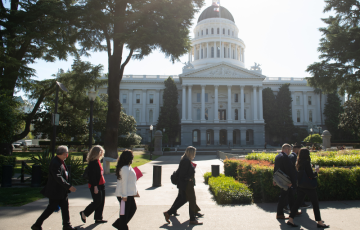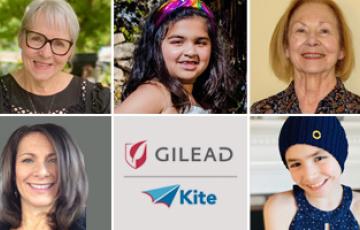Search Results
Racing Together to Find Blood Cancer Cures
The Leukemia & Lymphoma Society (LLS) Orange County Inland Empire Chapter is excited to announce a new partnership with Auto Club Speedway in Fontana, California. Auto Club Speedway, California’s premier motorsports facility, is geared up to support LLS by hosting a series of fundraising events throughout the coming year.
Auto Club Speedway continues to be involved in making a difference in the local community, and the driving force behind their partnership with LLS is the close connection blood cancer has had on the Speedway family.
Detection and treatment of Adult T cell leukemia/lymphoma in the premalignant stage.
Clonally expanded T cells carrying somatic mutations circulate in the premalignant phase of Adult T cell leukemia/lymphoma (ATL). We will develop capture-sequencing of recurrent ATL-driver mutations for use as a diagnostic tool for the detection/characterization of ATL-like clones in individuals with high risk of ATL, and, in an aligned clinical study, we will test whether a novel monoclonal antibody (targeting C-C chemokine receptor 4) can eradicate these high-risk cells.Novel targeted therapies for acute myeloid leukaemia and multiple myeloma
Outcomes for acute myeloid leukemia (AML) and multiple myeloma (MM) patients remain inadequate and new treatment options to combat resistance against existing agents are urgently needed. My research aims to identify and target selective vulnerabilities of AML and MM cells. I am particularly interested in epigenetic and metabolic pathways that control self-renewal and differentiation of hematopoietic cells and that can be leveraged to modulate cell fate for therapeutic benefit.Stopping Treatment for CML – Another First for a Blood Cancer
Certain patients with chronic myeloid leukemia (CML) who take nilotinib daily may have achieved such deep remissions that they may be able to stop their treatment, according to a recent FDA decision

Patients' Medical Histories Shouldn't Determine Whether They're Insurable
All patients deserve access to quality, affordable health plans. Fortunately, most insurance cannot use patients' pre-existing conditions against them. But these protections don't exist for Medicare Supplement Insurance, known as Medigap. In fact, Medigap is one of the only types of health coverage that can charge patients more, or deny them coverage, due to their age or health status.
LLS is advocating for policies that would allow patients to enroll in Medigap—without paying higher rates—regardless of their health or age.
Cardioprotective Strategies and Cardiotoxicity Prediction in Children with Acute Myeloid Leukemia
We seek to reduce the adverse cardiac effects of chemotherapy in pediatric AML patients. We are assessing markers of heart function and injury to compare two clinical strategies for prevention of chemotherapy-induced heart injury. We are also developing a tool using these markers of heart function to characterize a child’s risk for cardiac dysfunction, which is critical to guiding safe chemotherapy delivery.Glycotyping as a novel approach to study leukemia stem cell heterogeneity and function
Leukemia stem cells (LSCs) are highly heterogeneous populations and key contributors to AML progression. Here, I aim to employ heparan sulfate (HS) glycotyping to resolve LSC heterogeneity. Using complementary genetic and antibody-based approaches, I will delineate the functional roles of HS pathway during AML progression. The newer insights provided by these studies could potentially uncover novel LSC therapies and facilitate diverse training for me to become an independent leukemia researcher.Precision Medicine Inhibitor and Immunotherapy Approaches for High-Risk Childhood Leukemias
Dr Tasian’s scientific passion is successful development of precision medicine therapies for high-risk childhood leukemia. Her translational laboratory research program focuses upon investigation of kinase inhibitors and chimeric antigen receptor (CAR) T cell immunotherapies in childhood ALL and AML using primary patient specimens and patient-derived xenograft models. Through her laboratory and clinical research, she aspires to improve cure rates and minimize toxicities for children with leukemia.Targeting Leukemia Stem Cells in the Clinical Setting: The Development of A Comprehensive Program
My focus is to develop a program in which novel therapies targeting leukemia stem cells (LSCs) are tested in clinical trials. This is achieved via partnership with laboratory-based colleagues who identify vulnerabilities in LSCs. Once recognized, we find or develop drugs to exploit these weaknesses through clinical trials for acute myeloid leukemia patients. The goal is to bring forward new therapies that result in deep and durable responses, which also have the potential to cure this disease.Synergistic targeting of metabolic and epigenetic vulnerabilities in leukemia stem cells
Our lab is focused on identifying unique features that distinguishes acute myeloid leukemia (AML) stem cells from normal blood-forming stem cells. The cells that make more AML cells than others are called AML stem cells, and these cells need to be eradicated to achieve deep therapeutic responses. We believe targeting metabolism may achieve this goal and found strategies to target AML stem cell metabolism without harming normal stem cells. We hope that our study will lead to improved therapies against AML targeting metabolism to achieve deep remission with little toxicity.Lower Dose Mitoxantrone for Venetoclax Resistant Acute Myeloid Leukemia
Venetoclax-based regimens are the standard of care for many patients with acute myeloid leukemia (AML) and are highly active therapeutic strategies for this challenging disease. However, some patients do not respond, and most patients who do respond will relapse. We have discovered that resistance to venetoclax may be mediated by the movement patterns of calcium throughout a cell. Furthermore, we have found that mitoxantrone, a conventional chemotherapy agent, can interrupt these calcium fluctuations at very low doses.In Loving Memory of a Cancer-Fighting Legacy: UFCW Fights Cancer in Honor of Late Staff Member
The United Food and Commercial Workers (UFCW) is one of North America’s largest labor organizations with more than 1.3 million members.
Contest Winner Turns Passion into Purpose
More than 3,000 votes are in, and The Leukemia & Lymphoma Society has officially announced the winner for the 2017 Light The Night T-shirt contest. Congratulations to 49-year-old Greg Cunningham of Raleigh, North Carolina!
Powerful Partnerships are Helping to Save Lives
The Leukemia & Lymphoma Society (LLS) has helped millions impacted by cancer throughout their almost 70-year history. But the fight against blood cancers cannot be won without support.
Detection and Targeting of Enzymatic Base Editing Deregulation in Leukemia Stem Cells
Dr. Jamieson is examining the role of two enzymes (APOBEC3 and ADAR1) known to mutate DNA and RNA, and their role in acute myeloid leukemia (AML) and disease relapse, particularly in elderly patients.Barely Legal, Barely Leukemic: My CML Story
I arrived at college in September, barely legal, but fully ready to live out the Hollywood higher education stereotype. I was fighting a cold but didn’t let that stop me from attending every party I could. The revelry lasted until October, when the “cold” was diagnosed as chronic myelogenous leukemia (CML). I went to the university health center on suspicions of mono, and the next thing I knew I was on the oncology floor of a Boston hospital.

Beyond Blankets: Subaru Loves to Care brings comfort and warmth
Blood cancer treatment can be a scary and confusing time. And blood cancer patients want to feel like they’re not alone.
That’s why The Leukemia & Lymphoma Society (LLS) and Subaru are partnering to bring warmth and comfort to blood cancer patients through warm blankets, patient care kits, and handwritten notes of encouragement.

The Immune System and Blood Cancer: 4 Things You Need to Know
Immunotherapy uses the power of the immune system to treat blood cancer. Today it is a standard treatment that has a profound effect in some blood cancer patients, but it still falls short in others.
The Leukemia & Lymphoma Society (LLS) has been a champion of this type of cancer treatment for decades, supporting some of the earliest and most game-changing immune-based treatments for blood cancer. The advances have been astonishing, but there is so much further to go.
Venetoclax
Venetoclax is FDA approved
- For the treatment of adult patients with chronic lymphocytic leukemia (CLL) or small lymphocytic lymphoma (SLL).
- In combination with azacitidine, or decitabine, or low-dose cytarabine for the treatment of newly-diagnosed acute myeloid leukemia (AML) in adults who are age 75 years or older, or who have comorbidities that preclude use of intensive induction chemotherapy.
Cladribine
Cladribine is FDA approved to treat people who have active hairy cell leukemia. It is also used to treat some other types of leukemia and lymphoma.

